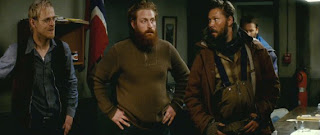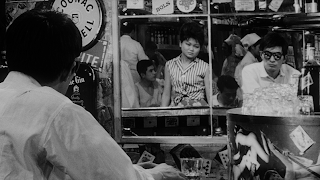Over the past decade, I (well, okay,
we) have been blessed and cursed with the success of the comic book movie. A sub-genre that was once scorned and ridiculed --- and rightly so, for the most part --- was given new life with the successful launches of the
Spider-Man and
X-Men franchises. Since those days, we have seen some great comic book movies (
The Dark Knight) and some truly awful ones (
X-Men Origins: Wolverine), along with a scattering of less traditional/costume-free entries (
Scott Pilgrim vs. the World). The true test of comic book movies, though, comes from how true they can stay to their roots. I'm not arguing that movies should adhere to the ridiculous continuity of their pulped roots; I'm saying that the logic and tone of the source material is essential to a good adaptation. One of the most common occurrences in comics is the cross-over; characters from one comic make a guest appearance in another, hopefully impressing new readers and gaining new fans. Until recently, each comic book movie series took place on its own, in an isolated bubble. Starting in 2008, though, Marvel Studios began to plan for a Marvel Movie Universe, where their superhero films would all occur in the same general time and place, eventually leading up to a huge team-up movie,
The Avengers. It's a simple idea, but it was also pretty damn risky. It meant launching multiple movie franchises and having them all be successful enough to encourage the development of
The Avengers, where characters require no origin stories and the film can focus on huge special effects. Is comic book publishing logic enough to make an entertaining movie? In a word, "yes."
 |
| In two words, "Hell, yes" |
I don't feel like explaining the plot of
The Avengers in detail. It's not a bad story, but I'm going to go with a "simpler is better" attitude here. A desperate and petty demigod, Loki (
Tom Hiddleston) has stolen a
tesseract. What the hell is a tesseract? Well, here, it looks like a glowing cube, but can apparently do all sorts of things.
 |
| Like make Loki give nasty grins |
Loki manages to use this cube to open a doorway in space, allowing aliens to invade Earth because...well, I mentioned the desperation and pettiness, right? Well, Earth has been through quite a lot over the past few summers, as chronicled in the documentaries
Iron Man,
The Incredible Hulk,
Iron Man 2,
Thor and
Captain America: The First Avenger; in other words, Earth has some heroes available to defend it.
And that's pretty much the plot.
Do you really need more than that in your action movie?
The Avengers does what it sets out to do; it combines a bunch of superheroes in a movie and gives them a suitably intimidating enemy to fight. The acting in the film is not terribly dramatic, but it's pretty good for what it is.
Robert Downey, Jr is still great as the egotistical and charming Tony Stark (AKA Iron Man). If this film leaned on any one character in particular, it was Iron Man. Luckily, Downey is still enormously entertaining in this role.
Chris Evans showed a little bit more range as Captain America this time around, thanks to larger doses of humor and smaller doses of melodrama than in his own movie.
 |
| ...and lots and lots of posing |
Chris Hemsworth is still fine as Thor, but he spent most of his time here fighting or standing in the background. The big surprise in
The Avengers was how awesome
Mark Ruffalo was as the Hulk. Ruffalo was less tragic than his Hulk movie predecessors, and that went a long way toward making him more fun to watch. Of course, the most awesome Hulk stuff happened thanks to CGI, but Ruffalo set the stage for it well by making his character seem downright reasonable.
 |
| Above: realizing how much better 13 Going on 30 would be with a Hulk |
But The Avengers are not made up solely of characters who have headlined their own films. The group also includes the marksman archer Hawkeye (
Jeremey Renner) and the super-spy Black Widow (
Scarlett Johansson). Renner is okay --- it's hard to justify an archer on a team with Thor --- but this role doesn't have enough meat for him to really do much with. Johansson was considerably less impressive. Granted, her character was utilized decently, even if she seems way out of her class in the battle scenes; still, the character was boring. She doesn't carry a lot of scenes on her own, though, so that and her tight pleather outfit more or less balances the defects in her character.
 |
| ScarJo, in her biggest action scene. Even she doesn't buy it. |
What about the rest of the cast of thousands?
Samuel L. Jackson finally got to be onscreen for more than a few minutes as Nick Fury and...honestly, I wanted to see him be a bigger bad-ass. It's not a big deal, but I was hoping for at least one scene where he does something that made my jaw drop; he wasn't bad, but he wasn't jaw-droppingly good, either. I enjoyed Tom Hiddleston as Loki, even if he was a touch whiny.
Clark Gregg had his most important part and surprisingly wound up being the heart of
The Avengers. It was a little melodramatic as a plot device, but Gregg very likable here. The rest of the recognizable cast was fine, but contributed little.
Colbie Smulders,
Stellan Skarsgard, and
Gwyneth Paltrow had the most to do, although only Paltrow was particularly likable. And if you like playing "spot the actor," you will enjoy looking for
Powers Boothe,
Harry Dean Stanton, and
Alexis Denisof.
The key to the success of
The Avengers came from screenwriter/director
Joss Whedon. Whedon has been able to deliver some great lines for many years, but this is easily the best script he has produced to date (that landed on the big screen, anyway). It might be a little light on emotion, but what little heart it has is taken advantage of fully. This is a very well-paced action movie, with enough downtime to allow for humor, but enough seriousness to not wind up a
Last Boyscout clone. The secret appears to be how well he times his beats; Whedon did a great job playing with audience expectations, even when it was only slightly. I have never really thought of him as an actor's director --- I suppose I thought of him as a story-first sort of guy --- but I loved how he had all these heroes portrayed. The characters butted heads in a believable way and worked together in a way that made sense, too. Surprisingly, the least likable hero in the film (Black Widow) fell into Whedon's historical comfort zone (strong female leads), but that was a small price to pay for how well he handled the movie's headliners. I was also impressed with some of the action scenes. There is one in particular, which shows each Avenger doing their thing in turn, as the camera pans from one hero to the next, that was just awesome to watch on the big screen.
First and foremost, though,
The Avengers is an action movie. And that is an understatement. Free of boring origin stories or emotional investment, this film was able to provide action scene after action scene, many of which could have been the cool climax to a lesser movie.
Each scene wowed, but the final battle, which took up a substantial portion of the movie, was thoroughly awesome. This didn't have to be the case; wanton destruction does not necessarily make a movie fun or exciting (
Transformers: Dark of the Moon, I'm looking at you). But
The Avengers was both. I think it is because each hero had multiple occasions to do something cool; with so many characters swaggering onscreen without interfering with each other, the audience gets scene after scene of characters taking turns at awesomeness. I should also point out how fantastic the Hulk looked in this movie. This isn't the first time somebody has created a CGI Hulk, but this was the first time that they used full motion capture; I don't know how much of a difference it made, but his face did look pretty Ruffalo-like.
 |
| Remember that time Mark Ruffalo was shot with lasers? |
Even better than the motion capture was the general attitude of the Hulk in this movie. I don't want to spoil it for anyone by over-explaining it, but the Hulk almost stole the show. To put it another way,
The Avengers does such a good job rehabilitating the Hulk character that I can't wait for another Hulk movie.
The Avengers is, of course, not blemish-free. It is a big, dumb action movie, after all. The general plot of the first half was a little weak; "get captured" is rarely a step in an excellent scheme. The aliens were a little generic. I would have liked to see more types of alien attackers, but I suppose they were all essentially faceless henchmen.
 |
| Literally faceless |
Hawkeye and Black Widow never really justified their inclusion in this story. I don't think either character was far off from fitting in, but neither really clicked, either with each other or the rest of the cast. The post-credits reveal of the behind-the-scenes villain might have made a handful of comic fans titter, but it was nowhere near enough to get the average moviegoer excited. Are any of these problems enough to seriously dent the fun factor of this movie? Not really. Of course, an action movie is only as good as its villain, and Loki wasn't quite dastardly enough for my tastes. Still, Hiddleston played the part well and made him evil to a satisfying degree.
 |
| Another flaw: when was Hawkeye in Inception? |
How good is The Avengers? I would argue that it is the best pure action movie to come out in at least a decade. Please feel free to disagree with that statement; I have put
some serious thought into it already and am primed for a fight. Chances
are, you already know how much you will enjoy The Avengers. Fans of
action movies and comic book flicks will be in love. No matter how good
you think it will be, you're underestimating it. If you're on the fence,
this is one of the most pleasurable summer popcorn flicks ever. If you
are tired of soulless comic book movie adaptations, then this Frankenstein's monster
made of the wet dreams of every marketing team everywhere will not change your
mind. It is what it is, and it's possibly the best of what it is. I
normally have to take a few grains of salt when sitting down to enjoy a comic
book flick, but The Avengers is so much fun that I fully expect it to join the
illustrious ranks of Die Hard and Predator in my action movie library. In
other words, I'm planning to watch this a few dozen more times and expect to
love it every time.















































